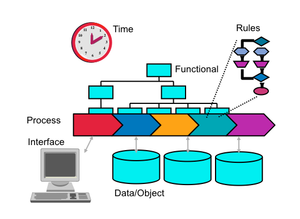advanced Systems Delivery
Duration 5 days
Brief Description
This course is intended to rapidly bring commercial developers up to speed on the practical use of advanced system delivery techniques including business process re-engineering, facilitation, prototyping, client server, graphical user interfaces (GUI), distributed objects, relational and object databases, Internet deployment and state of the art development tools: all set against the pervasive theme of leveraging object/component technology at the business (as well as technical) level. Legacy considerations are addressed, and advanced delivery vehicles including object request brokers, server side components, transaction monitors, workflow and Inter/intranet technology are considered.
Briefly, we cover:
- Understanding the business issues, requirements and problem domain through modeling
- Understanding the object and component environment in terms of technology, standards and architectures
- Managing the lifecycle and deliverables to ensure a seamless integration from business requirement to implementation design
The primary focus is on enterprise commercial systems (including web applications).
What Differentiates this Course?
Instructors that have really “been there and done that”, as well as having in depth theoretical and academic experience. The method covers all of UML, but is not constrained by it. We know where it is good and where it fails. We know how to use the techniques that work, but supplement them with other techniques where they don’t. Seamless progression from business view and requirements all the way through to a workable and accurate multi-tier technical design respecting modern technologies and architectures while facilitating reuse and reliability.
Intended Audience
This course is intended for those working as developers (analysts, designers, solution architects, programmers, testers, UI designers) in a commercial information systems context. Project and system development managers will also benefit.
Course Overview
The course covers all the important concepts and principles required of a developer in the typical modern commercial development situation. It goes from basics such as object oriented concepts, through important techniques such as domain, process and event modeling, to design considerations such as patterns, architecture and interfaces. It is structured to introduce topics in a logical didactic sequence (so concepts build on those previously covered), while at the same time walking down a typical life-cycle and showing how techniques are applied in a case study project. Delegates see how we move seamlessly from business requirements to models to designs and eventually code. Students work intensively in teams on a real world derived case study and apply all essential techniques.
Typical Coverage
The following outline indicates the topics addressed. The course is under frequent revision and Inspired reserves the right to deviate from this program in the interests of improvement and currency:
The OO Lifecycle
- Review of System Development Processes
- Simulation vs. Translation
- Prototyping and Iteration
- Business Partner Involvement
- Assembling from Components vs. Making
- Repository Based Development
- Achieving Reuse
Object Orientation Concepts
- Objects, Identity, Attributes, Methods
- Messages
- Encapsulation
- Containment
- Classes
- Inheritance
- Collections
- Polymorphism
- Components, Widgets and Business Objects
- Patterns
Modeling Business Domain Objects
- Entity Modeling Review
- Reaching Abstractions
- Modeling Inheritance and Class Hierarchies
- Modeling Roles
- Modeling Embedding
- Reference Relationships
- Adding Attributes
- Building the Repository
- CASE Tools
- Types of Business Objects
- Abstract Data Types
Enterprise Modeling and BPR
- Stakeholder & Value Chain Analysis
- Business Process Reengineering
- Continuous Business Improvement
- Convergent Engineering
- Business Process Modeling Notation and Tools
- Project Scoping
Modeling Business Events
- External (Business) Events and Use Cases
- Event Modeling
- Object State Transitions
Enhancing Models with Rules
- Declarative vs. Procedural
- Rule-based environments
- Rules notation
Prototyping and User Interfaces
- Choice of interface style
- Graphical User Interfaces (GUIs)
- Web and mobile interfaces
- User Interface Guidelines
- Prototyping
- Joint Application Development (JAD)
The Design Environment and Application Architecture
- Strong, weak and no typing
- Complex objects
- Graphics and Multimedia
- Interface File Types
- Languages and Environments
- Class Libraries and Frameworks
- Components, DLL's
- Client Server
- Object Database & NoSQL options
- Model, View and Controller (Layered Design Model)
- Web application options
- RESTful interfaces, JSON
- Scaling
Advanced Delivery Options
- Object CASE and round trip engineering
- Server-side components/Java Beans, Enterprise Java Beans and CORBA Beans
- J2EE, .net
- Internet/Intranet/IIOP
- Web services (XML, WSDL, SOAP)
- Workflow
- WorkGroup Technologies
- Advanced Human Computer Interfaces
Responsibility Based Design
- Application ("Model") Classes
- Business Logic ("Controller") Classes
- View Objects
- Adapting System Classes (altering, inheriting)
- Adapting Components (properties, inheriting)
- Interfacing with Legacy systems and data
- Inter-operability and standards
- Allocating Responsibilities to Classes
- Mapping Business Logic to Controller Sequences
- Transaction Management
- Packaging and subsystems
- Collaboration / Contracts
Management, Measurement, Scaling Up
- Managing the OO lifecycle
- Measurement, Reuse
- Multi-User and Multi-Project Issues
- Object Transaction Monitors
- Strategic Environment choice
Certification
Inspired issues certificates to those delegates who successfully complete the course. The course has been run over many years and we have trained hundreds of delegates for scores of organizations, so it is well recognised in the industry.
Provided Materials
Delegates receive high quality printed notes, including presentation slides, case study materials and assignments. They also receive a copy of the text book Advanced Systems Delivery with Objects, Components, Patterns and Middleware by Graham McLeod, the course author. Selected sample solutions are provided. A reference CD is provided with links, references and further reading material. NOTE: These materials may be provided online.
Location, Costs and Dates
The course is offered in Europe (Germany, Switzerland, Spain, Netherlands, United Kingdom) and South Africa (Cape Town, Johannesburg). It can be conducted onsite in other locations on request. Please consult the latest schedule for dates and pricing in local currency.


